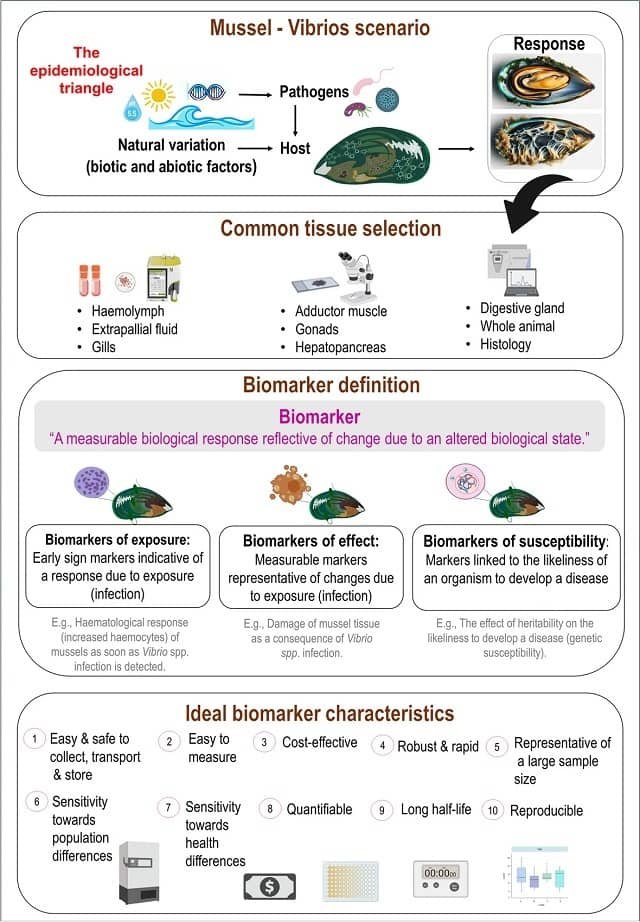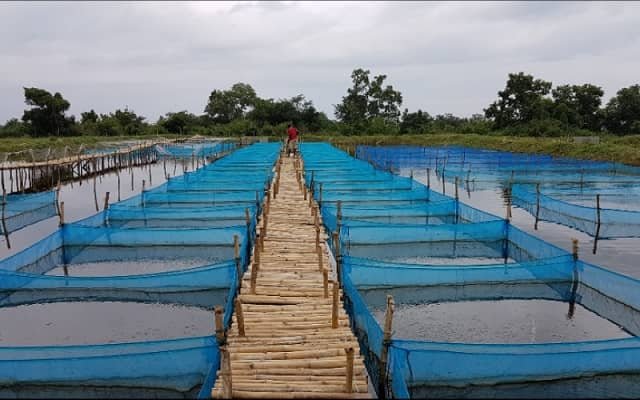
The mussel farming industry holds economic and social importance in many coastal areas around the world. But for over a century, a hidden enemy has lurked in the water: the Vibrio bacteria. These bacteria can cause infections in mussels, threatening their health and potentially impacting entire ecosystems.
So, how can we tell if mussels are healthy and capable of combating these infections? This is where the exciting field of biomarker research comes into play.
Scientists from the Auckland University of Technology (New Zealand) published a scientific review presenting previously identified mussel biomarkers and their relevance for mussel health monitoring programs, particularly in the context of exposure to pathogenic Vibrio spp.
Biomarkers: Unveiling the Mussel’s Defense System
Traditionally, scientists relied on chemical analyses to assess mussel health. Now they are incorporating “biomarkers,” biological indicators that reveal a mussel’s response to Vibrio or other stressors. These biomarkers can be found in the mussel’s hemolymph (blood) and tissues.
By studying biomarkers in mussels, scientists are gaining valuable insights into how mussels respond to Vibrio infections.
Scientists focus on three main types of biomarkers:
- Exposure Biomarkers: Reveal if a mussel has been exposed to Vibrio bacteria.
- Effect Biomarkers: Indicate how a mussel’s body reacts to Vibrio infection, such as changes in immune response or tissue damage.
- Susceptibility Biomarkers: Indicate if a particular mussel is more likely to get sick due to its genetic makeup or other factors.
By combining these different types of biomarkers, scientists can paint a more complete picture of mussel health.
Early Warning Systems: Protecting Our Seas
Biomarker research offers a variety of benefits for marine health:
- Early Detection: Biomarkers can detect contamination before it causes visible damage, allowing for early intervention.
- Healthy Mussel Populations: Healthy mussel populations are crucial for clean water and a thriving aquaculture industry.
- Resilient Ecosystems: Biomarkers can help identify and breed more resilient mussels, better equipped to withstand future challenges.
Benefits of Biomarker Research
Understanding mussel health through biomarkers has the potential to revolutionize various aspects of mussel management:
Stay Always Informed
Join our communities to instantly receive the most important news, reports, and analysis from the aquaculture industry.
- Climate Resilience: By identifying mussels most susceptible to changing ocean conditions, we can develop strategies to protect them.
- Biosecurity Boost: Biomarkers can help monitor and prevent the spread of diseases in mussel farms.
- Aquaculture Efficiency: Early detection of Vibrio infections can lead to better farming practices and reduced losses.
- Market-Ready Mussels: Biomarkers can ensure mussels are healthy and meet consumer safety standards.
Conclusion
Biomarker research for Vibrio-mussel interactions is a rapidly evolving field. As our understanding grows, we can develop more sophisticated tools to assess mussel health and implement effective management strategies.
In summary, the key conclusions of the study are:
- Mussel Biomarkers: A Powerful Tool: This study highlights the growing importance of mussel biomarkers in assessing the impact of bacterial contamination, particularly Vibrio spp., in aquatic environments.
Strengths of Mussel Biomarkers:
- Quantify levels of bacterial contamination.
- Reflect the combined effects of complex bacterial mixtures.
- Provide insights into the mechanisms of Vibrio impact.
- Serve as indicators of mussel health and recovery from stressors.
Limitations of Mussel Biomarkers:
- Non-specificity: Some markers may be influenced by environmental or biological factors.
- Chemical Dependence: Certain markers are affected by chemical influences.
- Transient Responses: Some biomarkers may have short-lived responses.
- Destructive Sampling: Collecting some biomarkers can harm mussels.
- Sensitivity Limitations: May not be sensitive enough to low levels of contamination.
- Resource Intensity: Long-term data collection can be costly.
The Future of Mussel Biomonitoring:
- Validation of biomarkers under real-world conditions (field studies).
- Establishing baseline data on healthy mussel responses (biobanks).
- Selecting and implementing appropriate bioassays for specific monitoring needs.
- Employing a multi-biomarker approach for a more comprehensive picture.
- Researching long-term biomarker responses to various bacterial contaminants.
- Integrating biomarker data into diagnostic tools for marine health assessment.
The study was funded by the Aquaculture Health Strategies to Maximize Productivity and Security program and the Shellfish Aquaculture Research Platform, funded by the New Zealand Ministry for Business, Innovation and Employment.
Contact
Andrea C. Alfaro
Auckland University of Technology
Private Bag 92006, Auckland, 1142, New Zealand
Email: andrea.alfaro@aut.ac.nz
Reference (open access)
Azizan, A., Venter, L. & Alfaro, A.C. Biomarkers of mussel exposure to Vibrionaceae: A review. Aquacult Int (2024). https://doi.org/10.1007/s10499-024-01531-2
Editor at the digital magazine AquaHoy. He holds a degree in Aquaculture Biology from the National University of Santa (UNS) and a Master’s degree in Science and Innovation Management from the Polytechnic University of Valencia, with postgraduate diplomas in Business Innovation and Innovation Management. He possesses extensive experience in the aquaculture and fisheries sector, having led the Fisheries Innovation Unit of the National Program for Innovation in Fisheries and Aquaculture (PNIPA). He has served as a senior consultant in technology watch, an innovation project formulator and advisor, and a lecturer at UNS. He is a member of the Peruvian College of Biologists and was recognized by the World Aquaculture Society (WAS) in 2016 for his contribution to aquaculture.







